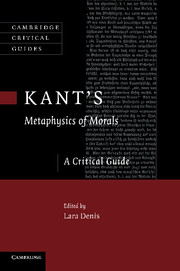Book contents
- Frontmatter
- Contents
- Notes on contributors
- Acknowledgements
- List of translations and abbreviations
- Introduction
- 1 Kant's Metaphysics of Morals: the history and significance of its deferral
- 2 Reason, desire, and the will
- 3 Justice without virtue
- 4 Kant's innate right as a rational criterion for human rights
- 5 Intelligible possession of objects of choice
- 6 Punishment, retribution, and the coercive enforcement of right
- 7 Moral feelings in the Metaphysics of Morals
- 8 What is the enemy of virtue?
- 9 Freedom, primacy, and perfect duties to oneself
- 10 Duties to and regarding others
- 11 Duties regarding animals
- 12 Kant's Tugendlehre as normative ethics
- Bibliography
- Index
Introduction
Published online by Cambridge University Press: 10 January 2011
- Frontmatter
- Contents
- Notes on contributors
- Acknowledgements
- List of translations and abbreviations
- Introduction
- 1 Kant's Metaphysics of Morals: the history and significance of its deferral
- 2 Reason, desire, and the will
- 3 Justice without virtue
- 4 Kant's innate right as a rational criterion for human rights
- 5 Intelligible possession of objects of choice
- 6 Punishment, retribution, and the coercive enforcement of right
- 7 Moral feelings in the Metaphysics of Morals
- 8 What is the enemy of virtue?
- 9 Freedom, primacy, and perfect duties to oneself
- 10 Duties to and regarding others
- 11 Duties regarding animals
- 12 Kant's Tugendlehre as normative ethics
- Bibliography
- Index
Summary
The Metaphysics of Morals, Kant's final major work in moral philosophy, is wide-ranging, complex, and often provocative. Its focus is not rational beings as such, but human beings in particular, and the duties, rights, and morally practical relations that obtain among us. As a whole, the Metaphysics of Morals deepens Kant's accounts of morality, moral psychology, and the spheres of right and virtue. Its Doctrine of Right sets forth not only fundamental, coercively enforceable principles of interpersonal conduct, but also a rational idea of a peaceful community of all nations. Its Doctrine of Virtue develops Kant's conception of virtue and accounts of particular ethical duties. Aspects of the Metaphysics of Morals, such as its overall lack of abstraction relative to the Groundwork or second Critique and its richness of anthropological detail, recall Kant's lectures on ethics. Other features, such as its preliminary discussion of the relation of the faculty of desire to practical principles, clearly exhibit the commitments of his critical moral philosophy.
Some of the positions that Kant articulates here – for example, about the relationship between the fundamental principles of right and the categorical imperative, or the role of feeling in moral motivation – have long been sources of dispute among Kant's interpreters. Some of his arguments – for instance, those concerning capital punishment, or duties regarding non-human animals – have ignited debate among ethicists more broadly.
- Type
- Chapter
- Information
- Kant's Metaphysics of MoralsA Critical Guide, pp. 1 - 8Publisher: Cambridge University PressPrint publication year: 2010

